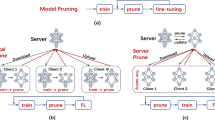Abstract
Federated Edge Learning (FEEL) is becoming a popular distributed privacy-preserving machine learning (ML) framework where multiple edge devices collaboratively train an ML model with the help of an edge server. However, FEEL usually suffers from a communication bottleneck due to the limited sharing wireless spectrum as well as the large size of training parameters. In this paper, we consider gradient quantization to reduce the communication traffic and aim at minimizing the total training latency. Since the per-round latency is determined by both the bandwidth allocation scheme and gradient quantization scheme (i.e., the quantization levels of edge devices), while the number of training rounds is affected by the latter, we propose a joint optimization of bandwidth allocation and gradient quantization. Based on the analysis of total training latency, we first formulate the joint optimization problem as nonlinear integer programming. To solve this problem, we then consider a variation of this problem where the per-round latency is fixed. Although this variation is proved to be NP-hard, we show that it can be transformed into a multiple-choice knapsack problem which can be solved efficiently by a pseudopolynomial time algorithm based on dynamic programming. We further propose a ternary search based algorithm to find a near-optimal per-round latency, so that the two algorithms together can yield a near-optimal solution to the joint optimization problem. The effectiveness of our proposed approach is validated through simulation experiments.
Access this chapter
Tax calculation will be finalised at checkout
Purchases are for personal use only
Similar content being viewed by others
References
Alistarh, D., Grubic, D., Li, J., Tomioka, R., Vojnovic, M.: QSGD: communication-efficient SGD via gradient quantization and encoding. Adv. Neural Inf. Process. Syst. 30 (2017)
Amiri, M.M., Gunduz, D., Kulkarni, S.R., Poor, H.V.: Federated learning with quantized global model updates. arXiv preprint arXiv:2006.10672 (2020)
Bernstein, J., Wang, Y.X., Azizzadenesheli, K., Anandkumar, A.: SignSGD: compressed optimisation for non-convex problems. In: International Conference on Machine Learning, pp. 560–569 (2018)
Bouzinis, P.S., Diamantoulakis, P.D., Karagiannidis, G.K.: Wireless quantized federated fearning: a joint computation and communication design. arXiv preprint arXiv:2203.05878 (2022)
Bubeck, S., et al.: Convex optimization: algorithms and complexity. Found. Trends® Mach. Learn. 8(3–4), 231–357 (2015)
Chang, W.T., Tandon, R.: Mac aware quantization for distributed gradient descent. In: IEEE Global Communications Conference, pp. 1–6 (2020)
Kellerer, H., Pferschy, U., Pisinger, D.: The multiple-choice knapsack problem. In: Kellerer, H., Pferschy, U., Pisinger, D. (eds.) Knapsack Problems, pp. 317–347. Springer, Heidelberg (2004)
Konečnỳ, J., McMahan, H.B., Yu, F.X., Richtárik, P., Suresh, A.T., Bacon, D.: Federated learning: strategies for improving communication efficiency. In: NIPS Workshop on Private Multi-party Machine Learning (2016)
Lin, X., Liu, Y., Chen, F.: Channel-adaptive quantization for wireless federated learning. In: 2021 IEEE/CIC International Conference on Communications in China (ICCC), pp. 457–462 (2021)
Liu, P., et al.: Training time minimization for federated edge learning with optimized gradient quantization and bandwidth allocation. arXiv preprint arXiv:2112.14387 (2021)
McMahan, B., Moore, E., Ramage, D., Hampson, S., Arcas, B.A.: Communication-efficient learning of deep networks from decentralized data. In: Artificial intelligence and statistics, pp. 1273–1282 (2017)
Seide, F., Fu, H., Droppo, J., Li, G., Yu, D.: 1-bit stochastic gradient descent and its application to data-parallel distributed training of speech DNNs. In: Fifteenth Annual Conference of the International Speech Communication Association (2014)
Tak, A., Cherkaoui, S.: Federated edge learning: design issues and challenges. IEEE Netw. 35(2), 252–258 (2020)
Wang, Y., Xu, Y., Shi, Q., Chang, T.H.: Quantized federated learning under transmission delay and outage constraints. IEEE J. Sel. Areas Commun. 40(1), 323–341 (2021)
Wen, W., et al.: TernGrad: ternary gradients to reduce communication in distributed deep learning. Adv. Neural Inf. Process. Syst. 30 (2017)
Acknowledgements
This paper is supported by the National Natural Science Foundation of China under Grant No. 61872171 and Grant No. 61832005, the Fundamental Research Funds for the Central Universities under Grant No. B210201053, the Natural Science Foundation of Jiangsu Province under Grant No. BK20190058, and the Future Network Scientific Research Fund Project under Grant No. FNSRFP-2021-ZD-07.
Author information
Authors and Affiliations
Corresponding author
Editor information
Editors and Affiliations
Rights and permissions
Copyright information
© 2022 The Author(s), under exclusive license to Springer Nature Switzerland AG
About this paper
Cite this paper
Yan, H., Tang, B., Ye, B. (2022). Joint Optimization of Bandwidth Allocation and Gradient Quantization for Federated Edge Learning. In: Wang, L., Segal, M., Chen, J., Qiu, T. (eds) Wireless Algorithms, Systems, and Applications. WASA 2022. Lecture Notes in Computer Science, vol 13473. Springer, Cham. https://doi.org/10.1007/978-3-031-19211-1_37
Download citation
DOI: https://doi.org/10.1007/978-3-031-19211-1_37
Published:
Publisher Name: Springer, Cham
Print ISBN: 978-3-031-19210-4
Online ISBN: 978-3-031-19211-1
eBook Packages: Computer ScienceComputer Science (R0)




